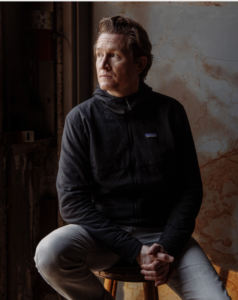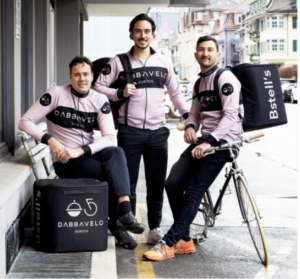Monocle, March 2021
As more companies pivot towards sustainable practices, we visit seven savvy firms shaking up their respective industries, while proving that doing business better needn’t compromise the bottom line.
Ryan Geller, CEO, Patagonia, Ventura, California
The ethical clothing brand’s new global head tells us why Patagonia’s remit will always be as much environmental as it is commercial.
Founded in 1973 by former climber Yvon Chouinard, Patagonia has long been speaking up about issues that go beyond the usual remit of an outdoor-clothing brand. Headquartered northwest of Los Angeles, the firm regularly features high up in fashion transparency and sustainability indices but is arguably better known for its activist stance. This has involved everything from picketing governments about oil and gas exploitation to defending public land rights – all part of its declaration of being “in business to save our home planet”. After 12 years at the helm, former ceo Rose Marcario left last year to be replaced by Ryan Gellert, who had spent six years heading the brand’s European operations from Amsterdam. Overseeing a company with revenues thought to be about €1bn (Patagonia doesn’t publish these figures), he spoke to Monocle from Ventura, California.
Are you looking to make your mark as Patagonia’s new CEO?
I don’t see it that way. I’m invested in doing what is best for us by living up to our mission statement on the effect that we want to have. So I’m shameless in stealing the best ideas from wherever they may be. Do we want to be thinking about new ways of doing things? Product line extensions, categories, whatever. Before I became ceo, we started a food business [Patagonia Provisions] a few years ago. I want to see that scale.
A lot of businesses have suffered from the pandemic. Do tough decisions need to be made now?
The laws of economic gravity apply to Patagonia like they apply to everybody else. And this has been the [fiscal] year we all know it to be. We’ll finish it smaller than a year ago. Some of that is intentional and some of that is a result of the pandemic. We feel comfortable with that. We’re not a revenue-driven business; we are very much a financial-health-driven business.
Why is a clothing brand like Patagonia involved in activism?
I’m not going to preach to other brands that they have to be activists; I can only tell you why we choose to be. There are two dimensions to Patagonia. One is being a responsible business. People often refer to us as leaders in sustainability. Let’s be clear, we’re not a truly sustainable business, despite our best efforts for 47 years. The external work is being part of an activist community. We’re in business to save our home planet and so we will offer opinions, scathing ones at times.
Is there are risk that you are contributing to polarisation?
I don’t want to be unconstructively contributing to that. But if the response is, “Shut up, let’s just all be quiet and keep businesses as usual” – that’s completely unacceptable. We have fouled our planet and we have a responsibility to change that. We live in a racist country [the US] that has hundreds of years of not treating all Americans as equals and we have a responsibility to contribute to changing that. Absolutely. Unequivocally.
Patagonia tells people to buy less. Some CEOs might wonder why. Can you explain your approach?
What’s the scorecard we’re all planning for? Is it just unbridled growth? Is the goal that every year you’re bigger and more profitable than the year before and that’s what success looks like? And anything that doesn’t match that simple, narrow definition is failure? The finances are a means to an end, not the other way around.
How big a part of the core business would you like to see upcyling and recycling become?
There’s this broad set of services that we have that use an umbrella term called Worn Wear. When I think of Worn Wear, it’s about helping customers to really think about the effects of their decisions. It will include rental in the future, that’s a natural extension. Hopefully we can start to create greater scale around circularity and move to a much higher level of recyclability, which is deeply embedded in our business. I would like to scale it to the point where those services are cannibalising our sales of virgin product. That’s the goal – we should be creating that challenge for ourselves.
Patagonia in numbers
72: Product-repair facilities globally
107: Retail stores globally
3,100: Employees globally
450: Employees deciding which organisations Patagonia supports
Basil Engler, founder, Dabbavelo, Zürich
One Swiss start-up is addressing the food-delivery sector’s throwaway problem, while proposing a more appetising pay cheque too.
Food-delivery businesses are thriving worldwide as takeaways are ordered via a swipe of a screen. But there’s a less palatable side to this transaction: wastage, such as containers and cutlery, is rife, while gig-economy delivery workers are often only paid per job. This is where Zürich start-up Dabbavelo steps in.
“We were angry at the rubbish,” says Basil Engler, who co-founded the company in 2019. The idea is based on the system perfected by Mumbai’s dabbawalas, a metal-lunchbox delivery and return service. In Dabbavelo’s case, peckish users choose a restaurant on its platform and pay a deposit for a plastic food container. Customers then return the container the next time that they order food or drop it off at Dabbavelo’s offices. “It’s important to use something more than once,” says Engler. “Our containers are used maybe 150 or 200 times.
Dabbavelo, run by seven people in their twenties, hasn’t stopped there. Its food is delivered only by bicycle and Engler, who has been a courier himself, knows that this “tough job” should be remunerated appropriately. Its 34 delivery workers receive chf25 (€23) an hour and there are plans to expand the current network to 60 riders.
Challenges remain. Only a handful of restaurants from more than 20 on the Dabbavelo platform use the containers because the company takes a slightly larger cut than for conventional packaging. But with a low-price promotion in place and a successful crowdfunding campaign to pay for more containers, Engler and his team are improving the product. There’s talk of expanding to other Swiss towns and possibly even Germany. But for now? “Small steps,” he says.

